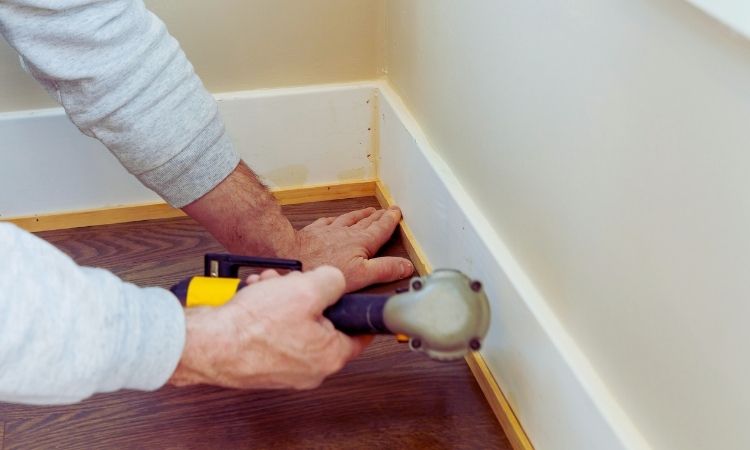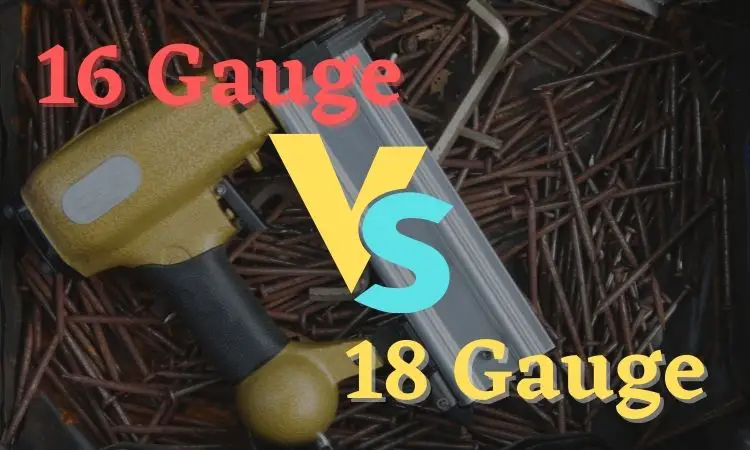When it comes to nailing, there are a few different types of tools that you can use. You have your hammers, nails, and saws - but what if you need to do some more precise nailing? In that case, you'll want to use a brad nailer or a finish nailer. But what's the difference between the two? And which one should you choose for your project?
What is Brad Nailer?
A brad nailer is a unique type of nail gun that uses small brad nails to attach pieces of wood or trim. They're often used for smaller projects since the brad nails are thinner and less visible than traditional nails.
They're also relatively easy to use, making them a good choice for beginners. But when it comes to power, brad nailers can't quite match up to finish nailers.
- Thin brads are used in construction. They're made of 18 gauge wire.
- Around 1.2065 mm
- Relatively less power than finish nailers
- Can be used for smaller projects
When Should You Use a Brad Nailer?
Brad nailers are perfectly suited for smaller projects, like attaching molding or trim. They're also a good choice for delicate work since the brad nails are less likely to split the wood. If you're working on a project that requires a lot of precision, a brad nailer is probably your pick bet.
Besides if you are a beginner, brad nailers are also a good choice if you're working on a budget. They're generally cheaper than finish nailers, so you can save some money without sacrificing quality.
What is a Finish Nailer?
A finish nailer is a type of nail gun that uses larger nails, called finish nails. These nails are thicker than brad nails, so they're better suited for heavier-duty projects. Finish nailers also have more power than brad nailers, making them a better choice for tougher jobs.
- Suits for 16-gauge and 15-gauge nails.
- For the higher loads and withstand any tricky work.
- Heavier duty projects.
- More power.
When to Use a Finish Nailer?
Finish nailers are greatly suited for larger projects, like attaching baseboards or framing. They're also a good choice for tougher jobs, like nailing through hardwoods. If you're working on a project that requires a lot of power, a finish nailer is probably your option.
Though, finish nailers are more expensive than brad nailers, so keep that in mind when making your decision.
So, Which one should you choose?
The answer depends on your project. If you're working on something small and delicate, go with a brad nailer. But if you're working on something larger and tougher, go with a finish nailer.
And if you're on a budget, brad nailers are generally cheaper. Whichever one you choose, make sure to read the instructions carefully before getting started.
What Are the Different Types of Nails?
Now that you know the difference between a brad nailer and a finish nailer, it's time to learn about the different types of nails. Nails are made from different materials, like steel, aluminum, and copper.
They also come in different sizes and shapes. The most common type of nail is the round-head nail. But there are also other types, like the flat-head nail and the spiral-shank nail.
Round-Head Nails:
- The most common type of nail.
- Made from steel, aluminum, or copper.
- Can be used for a variety of projects.
- Flat-Head Nails:
- A type of nail with a flat head.
- Made from steel, aluminum, or copper.
- Well suited for projects that require a lot of precision.
Spiral-Shank Nails:
- A type of nail with a spiral shank.
- Made from steel, aluminum, or copper.
- Well suited for projects that require a lot of power.
What Fact That Differentiates Brad Nailer from Finishing Nailer?
Power
The biggest difference between brad nailers and finish nailers is the amount of power they have. Brad nailers are less powerful than finish nailers, so they're not suited for heavy-duty projects. Finish nailers, on the other hand, have more power and can handle tougher jobs.
Cost
Brad nailers are generally cheaper than finish nailers, so they're a good choice if you're working on a budget. Finish nailers are more expensive, but they're also more powerful and can handle tougher projects.
Use and project
Brad nailers are suited for smaller projects, like attaching molding or trim. Finish nailers are suited for larger projects, like attaching baseboards or framing. Whenever you're using a nail gun, make sure to read the instructions carefully before getting started.
Durability:
Finish nailers are more durable than brad nailers, so they're a good choice if you're looking for a long-lasting tool. If you consider some tools that last long for the price, finish nailers are the way to go.
Brad nailers are less durable than finish nailers and good enough for working, but they're also less expensive. If you're looking for a tool that's both affordable and long-lasting, a brad nailer is a good choice.
Cordless Brad Nailer vs Finish Nailer
Both the cordless brad nailer and the cordless finish nailer have their pros and cons.
The cordless brad and finish nailer is more lightweight and easier to maneuver. The downside is that it doesn't have as much power as the cordless finish nailer. But if you're looking for a tool that's easy to use, a cordless brad nailer is a good choice.
What Consideration Should I take To Choose a Nailer?
When choosing a nailer, there are a few things you should keep in mind. First, think about the project you're working on. If it's small and delicate, go with a brad nailer. If it's larger and tougher, go with a finish nailer.
Second, consider your budget. Brad nailers are generally cheaper than finish nailers, so they're a good choice if you're working on a tight budget.
Finally, think about the features you need. If you're looking for a tool that's easy to use, go with a cordless brad nailer. If you need more power, go with a cordless finish nailer.
Is it effective to use both a cordless brad nailer and a finish nailer on the same project?
It depends on the project. If it's a small, delicate project, then using both a cordless brad nailer and a finish nailer might be overkill. However, if it's a larger, tougher project, then using both types of nailers might be necessary.
Whenever you're using a nail gun, make sure to read the instructions carefully before getting started. And always use safety glasses to protect your eyes from flying debris.
Nail guns are a great way to get things done quickly and efficiently. But before you start your next project, be sure to choose the right nailer for the job.
Conclusion:
Though both are used for nailing, it's always preferable from the professional point of view that you should know when to use which. At the end of the day, it's your project and your money, so choose wisely. We hope this article helped you understand the difference between a brad nailer and a finish nailer.

I am a graduate of Bangladesh Agricultural University, where I delved into various agricultural disciplines, equipping me with a profound understanding of agriculture. Beyond academics, I have hands-on experience in gardening and crop cultivation. My passion is to embrace sustainable farming and horticulture. With a BSc in Agriculture, I am dedicated to promoting environmentally conscious and efficient agrarian practices.
Bachelor of Science (BSc) in Agriculture (Hons.)
Master of Science. (Sustainable Agriculture & Food Security ) (MS)
Bangladesh Agricultural University



![Best Nail Gun for Hardie Trim And Buyer Guide in 2022 [Top Pick] Best Nail Gun for Hardie Trim](https://broadpick.com/wp-content/uploads/2022/02/Best-Nail-Gun-for-Hardie-Trim.jpg)
